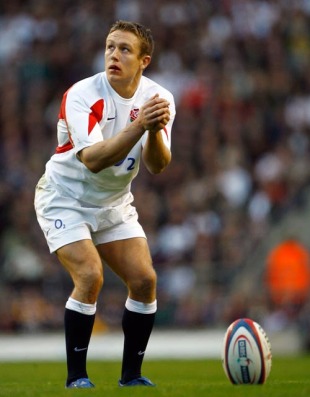- February 3 down the years
Jonny on the comeback trail

2007
Another Jonny Wilkinson comeback. In his first match for England since the 2003 World Cup final, he scored in every way you can in a rugby match: try, conversion, penalty goal, drop goal. It made him the only player to achieve this three times in international matches. His try should have been disallowed for foot in touch, but Scotland couldn't complain too heavily: they lost 42-20. While Wilko was contributing 27 points, three players were all winning their 50th caps for England: Martin Corry, Mike Tindall, and Phil Vickery.
1956
By winning the downhill, Toni Sailer became the first skier to win three gold medals at the same Winter Olympics. At the time, it was all three golds, and he'd already won the slalom and giant slalom. He almost didn't take part in the downhill. A strap broke on his skis and no-one came up with a spare one until the coach of the Italian team saved the day with ten minutes to spare. Sailer finished more than three seconds faster than the silver medallist. The Olympics counted as World Championships at the time, and Sailer's three wins gave him the combined title, which wasn't part of the Games. His three wins at one Winter Olympics were equalled in unexplained circumstances on February 17, 1968.
2007
Laila Ali's last fight. Muhammad Ali's daughter, she was unbeaten in 24 pro fights, including ten world title bouts, with 21 knockouts - but there was heavy criticism of her refusal to fight the top contenders.
2001
Neil Jenkins became the first player to reach 1,000 points in international rugby. But his conversion and penalty were nowhere near enough to prevent a heavy defeat at home. Will Greenwood, in his bleach-blond phase, became the first to score three tries in a match for England against Wales since January 7, 1893. They led 29-8 at half-time and won 44-15. Greenwood's father Dick captained England in 1969 and coached them from 1983 to 1985.
1969
Retief Goosen was born in South Africa and survived being hit by lightning as a teenager. When he missed a two-foot putt to win the US Open in 2001, no-one gave him a chance in the play-off. But he must have thought positive thoughts overnight, because he came out and beat Mark Brooks by two shots. Goosen won the event again in 2004, the same year that he beat Jeff Maggert 12 & 11, the widest margin of victory at the World Matchplay. He topped the European Order of Merit in 2001 and 2002. Quiet and unobtrusive, he's managed to avoid attracting any more lightning.
1990
Javelin thrower Steve Backley won his first Commonwealth Games gold medal. He broke the championship record twice on the same day to finish ahead of his England team mate Mick Hill and New Zealand's Gavin Lovegrove. The three of them finished in the same order four years later.
1990
A 16-year-old Cathy Freeman won gold in the sprint relay - and Jonathan Edwards finished second in the triple jump to Marios Hadjiandreou, the first Cypriot to win a Commonwealth Games gold medal. Edwards took silver again at the next Games and didn't win gold until 2002.
1938
Emile Griffith was born in the US Virgin Islands. A clever and durable boxer, he was world champion at welterweight and middleweight. He spanned 15 years in world title fights, the last when he was 38, losing the last five spread over eight years, including defeats by class acts like Nino Benvenuti, José Napoles and Carlos Monzón. He took the invincible Monzón all the way in 1973. He fought Benvenuti three times, losing the middleweight title twice but regaining it in between, having first won it from the solid Dick Tiger in 1966.
1872
Sidney Smith was born in Gloucestershire. With Frank Riseley (born July 6, 1877), he was Wimbledon doubles champion in 1902 and 1906, and they were losing finalists in the three years in between. All five of their finals were against the great Doherty brothers. Smith did pretty well for someone who had to play in a leg iron. Anything he lacked in getting to the ball he made up for with the ferocity of his forehand when he got there: it was one of the famous weapons. He was Wimbledon mixed doubles champion in 1903 and 1904 and runner-up in the singles in 1900, the same year he became the inaugural All-England badminton champion. A sport where there's less court to cover with a bad leg.
1911
Tom Creavy was born. He was only 20 when he won his only Major, the USPGA in 1931.

